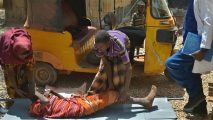Privacy Overview
This website uses cookies so that we can provide you with the best user experience possible. Cookie information is stored in your browser and performs functions such as recognising you when you return to our website and helping our team to understand which sections of the website you find most interesting and useful.


















9, April 2020
Cameroonians are worried about coronavirus but also about an absent president 0
Like elsewhere, Cameroonians at home and abroad are very worried over the novel coronavirus which has been rapidly spreading across the country.
By the close of April 7, Cameroon had registered 685 cases of Covid-19, with nine deaths, overtaking other countries to become the second hardest hit in Sub-Saharan Africa after South Africa. Cameroon now has over 15 times as many confirmed cases as any other country in the central African sub-region and one of the highest numbers of daily new cases on the continent. Like many other African countries, Cameroon is not well-equipped to handle a major outbreak of the disease.
But as Cameroonians grapple with the spread of Covid-19, they are also preoccupied with the absence of their leader. President Paul Biya, 87, who in 2018 secured another mandate to extend his 36-year rule to 2025, has not publicly addressed his compatriots since the country registered its first case on March 6. His next-door peer, Ali Bongo Ondimba of Gabon, with just 30 confirmed cases, has addressed his people on at least three occasions, despite still recuperating from a stroke.
Biya was last seen in public on Mar. 11, when he received the US ambassador to Cameroon at the Unity Palace in Yaoundé. No official mention has been made of his whereabouts thereafter. Even pressure from activists and opposition leaders has not forced the African strongman out in public.
Two weeks ago, Cameroon’s main opposition leader, Maurice Kamto issued an initial seven-day ultimatum, calling on president Biya to personally address the nation. On April 3, Kamto called on the population of coronavirus-affected regions to stay at home—a move the runner-up of the 2018 presidential election said he took because “the Head of State has refused to assume his functions in the fight against the coronavirus.”
The Popular Action Party on its part expressed concerns over the inaction of President Biya and accused Yaounde authorities of playing “a hide-and-seek game.” The party promised to seize the country’s constitutional council to make a declaratory statement on the vacancy or not of the presidency.
Despite his country exhibiting multiple layers of vulnerability to Covid-19, Biya has stuck with his reticence for public speaking. He however instructed the prime minister to put in place a 13-point response strategy and has through social media called on Cameroonians to respect the measures put in place. From wherever he is, the president has also signed several decrees, including one instituting a national solidarity fund to fight COVID-19 and another appointing officials to lead the reconstruction of the conflict-ravaged English-speaking regions in the country’s southwest.
It isn’t unprecedented for Biya to be unseen or silent during critical moments in the life of the country. Even recent widespread rumors of his demise on social media have not forced his hand. His aides and supporters have described this phenomenon as “presidential silence” and have often argued that “his attitude is a sign of maturity and wisdom.”
Biya’s “private visits” to his usual retreat at the Intercontinental Hotel in Geneva has often been a source of political controversy and quiet embarrassment. One estimate is that he’s spent 15% of his time in power, abroad.
Over the last decade, Biya has made the top floor suites of the five-star luxury hotel into his home away from home spending months at a time even as his country has slowly descended into conflict from Boko Haram Islamic terrorists in the north and an Anglophone-led insurgency in north- and southwest of the country.
Culled from Quartz Africa